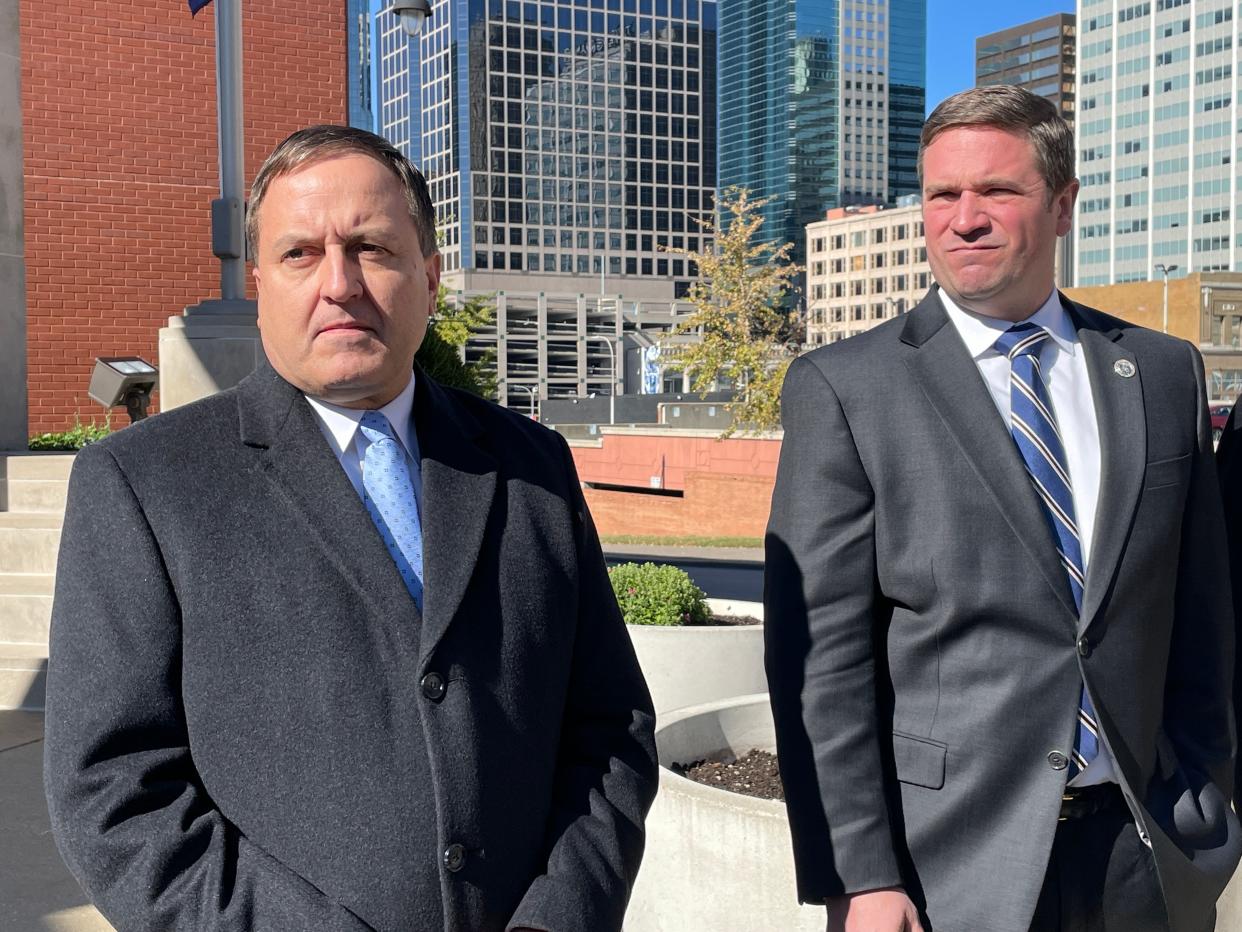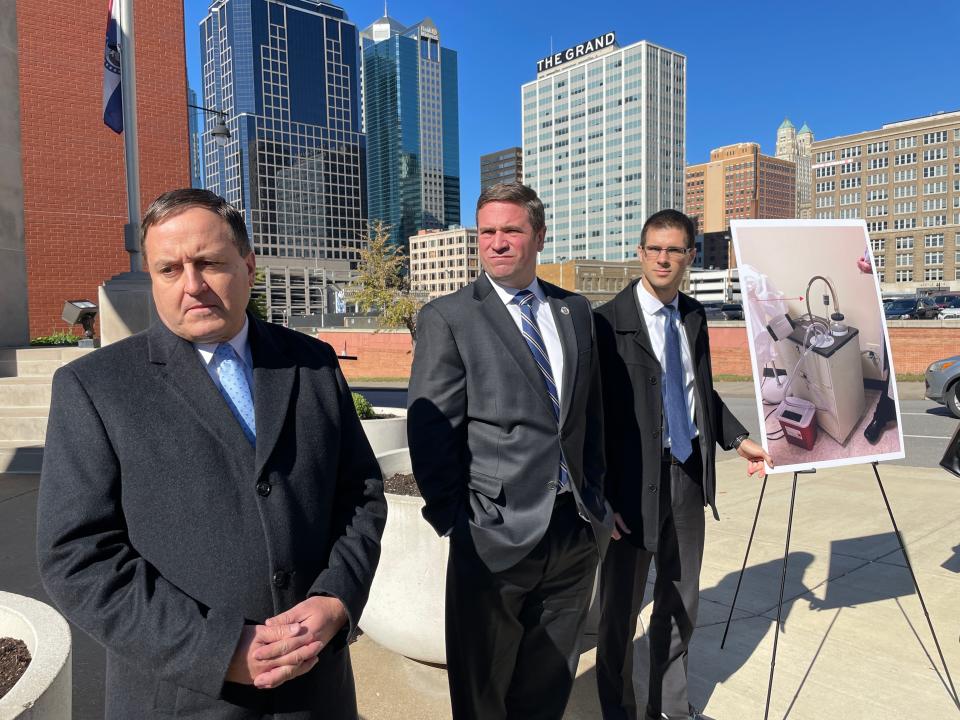Missouri appeals court affirms abortion-rights fiscal note, provides new summary language

- Oops!Something went wrong.Please try again later.
Ballot summary language for several abortion-related initiative petitions prepared by Secretary of State Jay Ashcroft was insufficient, judges at the Western District Court of Appeals have ruled, upholding a lower court decision.
"The Secretary’s summary statements are replete with politically partisan language. After removal of the inaccurate and partisan language of the Secretary’s summary statements, the circuit court was left with largely unworkable summary statements," judges wrote in the opinion. "The circuit court was authorized to write alternative language to fulfill its responsibility that a fair and sufficient summary statement be certified.”
Although the judge’s disagreed with some of the language in the lower court’s rewritten ballot summaries, they did not revert to any of Ashcroft’s original statements.
The ballot summaries, which could appear on Missouri ballots in a coming election if petitioners are able to gather the required signatures. But the signature gathering process has been delayed by extended legal wrangling about the way Republican state officials have written the official descriptions of the proposals.
“Today, the courts upheld Missourians’ constitutional right to direct democracy over the self-serving attacks of politicians desperately seeking to climb the political ladder," the ACLU of Missouri said in a statement. "The decision from Missouri Court of Appeals is a complete rebuke of the combined efforts from the Attorney General and Secretary of State to interfere and deny Missourian’s their right to initiative process.”
Ashcroft’s language asked voters if they wanted to “allow for dangerous, unregulated, and unrestricted abortions, from conception to live birth, without requiring a medical license or potentially being subject to medical malpractice.”
Cole County Circuit Court Judge Jon Beetem rewrote Ashcroft’s language to ask voters if they want to establish the “right to make decisions about reproductive health care, including abortion and contraception,” which would abolish the statewide ban on abortion.
“Once again Missouri courts refused to allow the truth to be known," Ashcroft said in an emailed statement. "The Western District essentially approved the language that was entirely rewritten by Judge Beetem. Not only is the language misleading but it is categorically false."
However, appellate judges found that the circuit court erred when it failed to include language that indicated that these initiative petitions would remove the ban on abortion “at any stage of gestation.”
Although an abortion being performed after 24 weeks or fetal viability would have to be medically necessary for the health of the mother, it is, as Appeals Court Judge Thomas Chapman said in Monday’s hearing, a “sea change” from the restrictions under Roe v. Wade.
"The circuit court’s opinion admits the real issue is about abortion. The Western District today continued to gloss over the issue in its affirmation," Ashcroft said. "We stand by our language and believe it fairly and accurately reflects the scope and magnitude of each petition.”
The remainder of Ashcroft’s language in this clause was affirmed to be inaccurate, and “does not give voters a sufficient idea what the proposed amendment[s] would accomplish.”
Ashcroft’s language would have led voters to believe that anyone, regardless of medical training, could conduct abortions in unsanitary conditions. The court did not find that any of the initiatives would permit such acts.
“Disallowing health and safety regulations — including requirements that physicians perform abortions and that they maintain medical malpractice insurance — is not a probable effect of the initiatives,” according to the opinion of the court.
More: Missouri appeals court hears arguments in abortion-rights cases. New legal challenges loom
Appellate judges added language in some of the summaries that would “require the government not to discriminate, in government programs, funding, and other activities, against persons providing or obtaining reproductive health care.”
The non-discrimination clause was a point of discussion at the Monday hearing, as judges questioned whether the government could face repercussions for providing health care funding to clinics that provide abortions, even if the funding was meant for other reproductive health care.
State law prohibits state funds from being used in abortion proceedings that are not necessary to save the life of the mother.
The appeals court found that Ashcroft’s original ballot summary language, which would “require the government not to discriminate against persons providing or obtaining an abortion, potentially including tax-payer funding,” contained some charged language.
The appellate court found that the lower court erred in failing to certify the language, with the exception of the terms “abortion” and "tax-payer funding” which was changed in the new language released Tuesday.

In the second case disputing the projected costs or savings to the state of reinstating the right to abortion, the court upheld the entirety of the lower court’s decision.
"I want to applaud the court for their decisive and unanimous ruling which makes it clear my office did its job with integrity," State Auditor Scott Fitzpatrick said in an emailed statement. "I oppose these measures and wholeheartedly agree with the other opponents that protecting innocent life is vitally important, but that does not and cannot influence my duty to honestly inform the voters of the state as to their potential costs."
Judges saw no risk that Medicaid funding would be lost. Additionally, extrapolating statewide the cost estimate of $51,000 submitted by Greene County would be inappropriate, as many other state entities responded with no projected costs of savings if the ballot initiatives were to pass.
“The Auditor’s fiscal note and fiscal note summary for the proposed initiative petitions submitted by Dr. Fitz-James are fair and sufficient,” the court wrote in its opinion.
"We have now been sued twice over these initiatives, our work has endured the intense scrutiny of 10 different judges at every level of our court system, and all of them have said we did our job within the confines of the law," Fitzpatrick said. "We will continue to do that and will defend our work as often as necessary in order to ensure voters have unbiased fiscal impact information on their ballots."
Both Ashcroft and Missouri Attorney General Andrew Bailey indicated yesterday in a press conference following the hearing that they would appeal if the ruling of the appellate court was not in their favor.
“We remain undeterred in our fight to protect the health and safety of women and children from the radical abortion activists working to turn Missouri into California,” Bailey wrote in an emailed statement.
This article originally appeared on Springfield News-Leader: Missouri appeals court affirms abortion fiscal note, adds summary language

